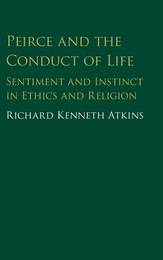
|
Peirce and the Conduct of Life: Sentiment and Instinct in Ethics and Religion
Hardback
Main Details
Description
Charles Sanders Peirce (1839-1914) is regarded as the founding father of pragmatism and a key figure in the development of American philosophy, yet his practical philosophy remains under-acknowledged and misinterpreted. In this book, Richard Atkins argues that Peirce did in fact have developed and systematic views on ethics, on religion, and on how to live, and that these views are both plausible and relevant. Drawing on a controversial lecture that Peirce delivered in 1898 and related works, he examines Peirce's theories of sentiment and instinct, his defence of the rational acceptability of religious belief, his analysis of self-controlled action, and his pragmatic account of practical ethics, showing how he developed his views and how they interact with those of his great contemporary William James. This study will be essential for scholars of Peirce and for those interested in American philosophy, pragmatism, the philosophy of religion, the philosophy of action, and ethics.
Author Biography
Richard Atkins is Assistant Professor of Philosophy at Boston College, Massachusetts. He is the author of Puzzled?! An Introduction to Philosophizing (2015) and numerous essays on the philosophy of Charles Sanders Peirce.
Reviews'... it is a review of contemporary Peirce scholarship as scholars argue about the correct interpretation of Peirce's often ambiguous texts.' The Review of Metaphysics '... this is a valuable and important book that should appeal to a variety of readers, not only Peirce scholars, but readers interested more generally in pragmatism, ethics, and the philosophy of religion.' The New England Quarterly
|